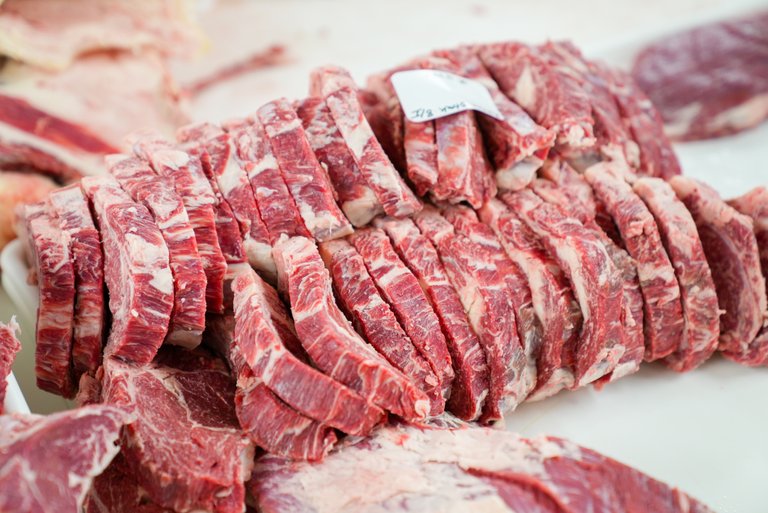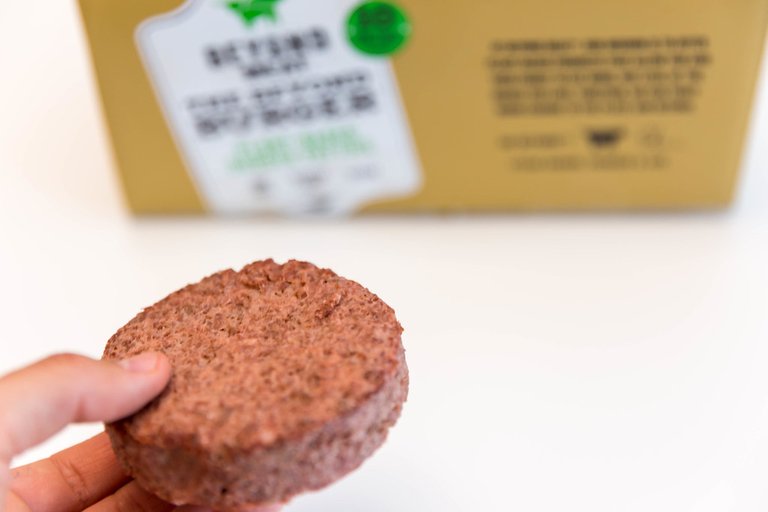Finding an Alternative to Livestock Meat - (Plant-Based Meat, The future of Agriculture)
Beef, Pork, Venison, Mutton, Squab, Chevon, Chicken, and so on. Unless you are a vegetarian, you would have in one way or the other eaten one of these or even one I didn't mention, and the probability that you ate one today, is very high. Either we kill and eat them to celebrate festivity, or for daily consumption, eating meat has become a part of our lives. While I am not against eating meat, because come to think of it, I love meat so much, but we cannot but tell ourselves the truth that overtime, we would have to find alternatives.

Humans didn't just start eating meat from the days of evolution, meat-eating dates back as far as 2.6 million years ago. This was first identified by butchering marks on the early man's bone. It would be for sure that at this point, man was hunting animals for food, and not rearing them. It wasn't until about 10,000 years ago that we started to see humans domesticate animals for the purpose of eating. Asides the religious belief and aspect of eating meat for certain celebrations, humans have loved eating meat because of its taste, and its nutrient. Meat is a very good source of nutrients such as protein, vitamins, and minerals. This vitamin and minerals span through Zinc, Iron, and Vitamin B12. To better understand the importance of meat, the body requires iron to be able to produce red blood cells, and Iron can be gotten from plants and animals. While plant produces nonheme iron which body weakly absorbs, animals produce iron rich in heme, and this iron is well absorbed by the body.
Unlike 10,000 years ago, human population was just about 4.43 Million , but today, the human population has increased to 7.96 Billion People in 2022, and with this, it is expected that our meat consumption would have increased. As expected, there have also been a major growth in the number of livestock available to humans. There have been a double in the number of poultry available in the world, from 14.3 billion in 1990, to 33 billion in the year 2020, there are about 1 billion cattle in the world, and over 780 million pigs n the world. While both human and domestic livestock population are increasing, it is important to know that our appetite for consuming meat has also increased. In a year, there are over 70 billion land animals killed for the sole purpose of food, and this isn't including sea animals. We must confess, that human population isn't going to reduce in the coming years, (I guess there is a competition for which country has the highest population), the United Nations say that the world’s population will increase to 9.7 billion in the year 2050, and nearly 11 billion around 2100, and so will the rearing, and killing of livestock animals will continue if we don't find an alternative.
Someone would ask, "why do we need an alternative, meat is good?". The truth is just like anyone else, I love eating meat, but then, we have to put into consideration, our resources as well as our health. I do not mean eating meat isn't good for our health, I mean what these animals can cause. I will start from Land usage.
The total earth surface is 509,600,000 square km, and the total area of dry land on earth is 148 326 000 square km. Humans have used 71% (104 million square km) of the total land are, leaving the remaining 29% which are barren (deserts, rocks) and glacier lands (Antarctica). We might say we have used the land properly, but the truth is we only occupy 1% of the habitable land which we use for industries, rural and urban regions for homes, and so on. 49% of the habitable land are forests, shrubs, and small fresh water rivers and lakes, while the remaining 50% [51 Million Square km] of the earth land is used for agricultural purposes, with 77% of the agricultural land used for livestock, while the rest is used for cultivation. While it looks like agricultural land is a good idea, we need to understand that those lands were previously forest which have undergone deforestation leading to the death and possible extinction of a lot of plant and animal species. Finding alternatives for meat, will help return most of those lands to forests and natural habitats for a lot of species. Agriculture has been one of human's greatest detrimental impact to the environment. I will get to that later.
Still on resources, I will look into Water Usage. In one of my previous post, Save Earth's Water - The Reality of Water Scarcity, I explained the possibility of water scarcity in the world overtime, and I mentioned how much water it takes to produce 1 kg of beef. In the post, I mentioned that 1 kg of beef would cost 15,415 liters of water to produce, which is a lot in a world where so many countries will soon have into water scarcity. Agriculture amounts to 70% of the world's fresh water consumption, and since there is an estimated increase in human population, if an alternative way isn't explored for meat production, then agriculture will need to expand up to 70% of its current size to be able to feed the population, and just like there will be expansion in the agricultural sector, other areas of human lives will expand thereby leading to a high demand of water. According to the World Bank, when this happens, water re-rationing will be needed, and this water rationing will affect the agricultural sector, especially in regions with water scarcity. This will lead to shifting the usage of water from places of lower productivity and higher waste, to places of higher productivity, little to no waste, survival, and employment activities.
Back to the detrimental impact in the environment. Agriculture has a great impact in climate change. According to Research Program on Climate Change, Agriculture and Food Security (CCAFS), and the World Bank, Agriculture generates about 19 – 29% of the total greenhouse gas emissions. Livestock emits an equivalent of 7.1 Gigatonnes of CO2 yearly. Yearly, a cow belch 220 pounds of methane, this doesn't include its feces or waste after killing. These gases which includes CO2, N2O, and CH4, amongst others are responsible for world global warming. Other harmful effect on the environment includes pollution and creation of waste.

Since livestock farming accounts for 77% of the total land usage, as well as higher number of detrimental effects, it would be good to see alternatives. One alternative will be plant based meat. Over the years, scientist have been trying to improve on plant base meat so it could taste like meat. The addition of soy leghemoglobin were first introduced to make plant based meat taste like meat, and it does give it the taste, but scientists are still trying to improve on meat creations. In recent times, scientist started growing chicken cells for meat in the lab. The cells are grown for 2 weeks, after which they become edible animal tissue, thereby preventing the killing of animals. This methods are very cheap, as companies like Mosameat are able to cut their production cost from $330,000 by 80x within the space of 2013, and 2021, to sell its Burgers for $10. A lot of wealthy people, including Bill Gates have been investing in this future, and hopefully, it will help solve the meat problem and serve as a better alternative to meat.
Reference
Statista.com - Number of chickens worldwide from 1990 to 2020
Faunalytics.org - Global Animal Slaughter Statistics And Charts
Research Program on Climate Change, Agriculture and Food Security (CCAFS).
Freethink - Murder-free chicken nuggets: Real meat grown in a lab
Images
https://www.pexels.com/photo/sliced-meat-on-white-tray-7163994/
https://www.flickr.com/photos/160866001@N07/47014899504
Congratulations @bimbo45! You have completed the following achievement on the Hive blockchain and have been rewarded with new badge(s):
Your next target is to reach 3500 upvotes.
Your next payout target is 100 HP.
The unit is Hive Power equivalent because post and comment rewards can be split into HP and HBD
You can view your badges on your board and compare yourself to others in the Ranking
If you no longer want to receive notifications, reply to this comment with the word
STOPTo support your work, I also upvoted your post!
Check out the last post from @hivebuzz:
Support the HiveBuzz project. Vote for our proposal!
Your content has been voted as a part of Encouragement program. Keep up the good work!
Use Ecency daily to boost your growth on platform!
Support Ecency
Vote for new Proposal
Delegate HP and earn more
Breakthrough in lab-grown meats is a piece of good news for vegetarians - a section of them though.
Yes, for vegetarians, but there are a lot of meat eaters that would not be able to let go of meat, or imagine themselves having to eat plant-based meat.
Thanks for your contribution to the STEMsocial community. Feel free to join us on discord to get to know the rest of us!
Please consider delegating to the @stemsocial account (85% of the curation rewards are returned).
Thanks for including @stemsocial as a beneficiary, which gives you stronger support.
I used to be a big fan of meat oo, but my teeth are just too sensitive these days and for some other reasons, I have slowed down on meat consumption a little bit, it seem I am on the right path after all.
LOl... Well, before the plant-base meat become a thing, you should keep eating the meats you can. :)